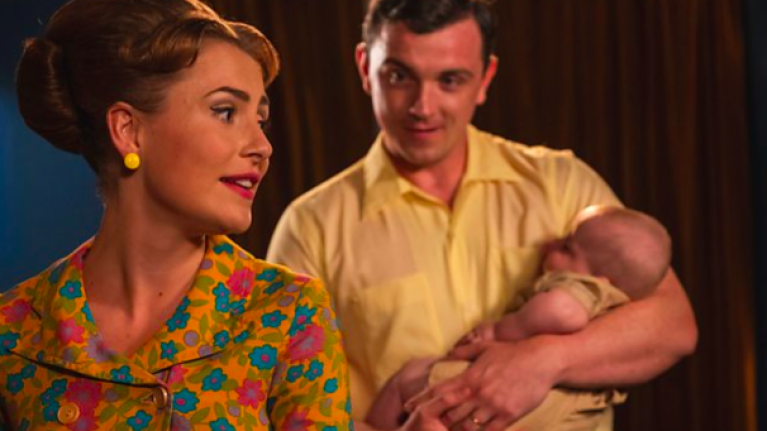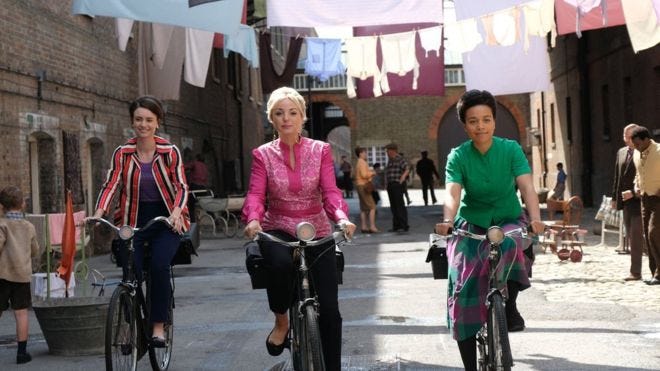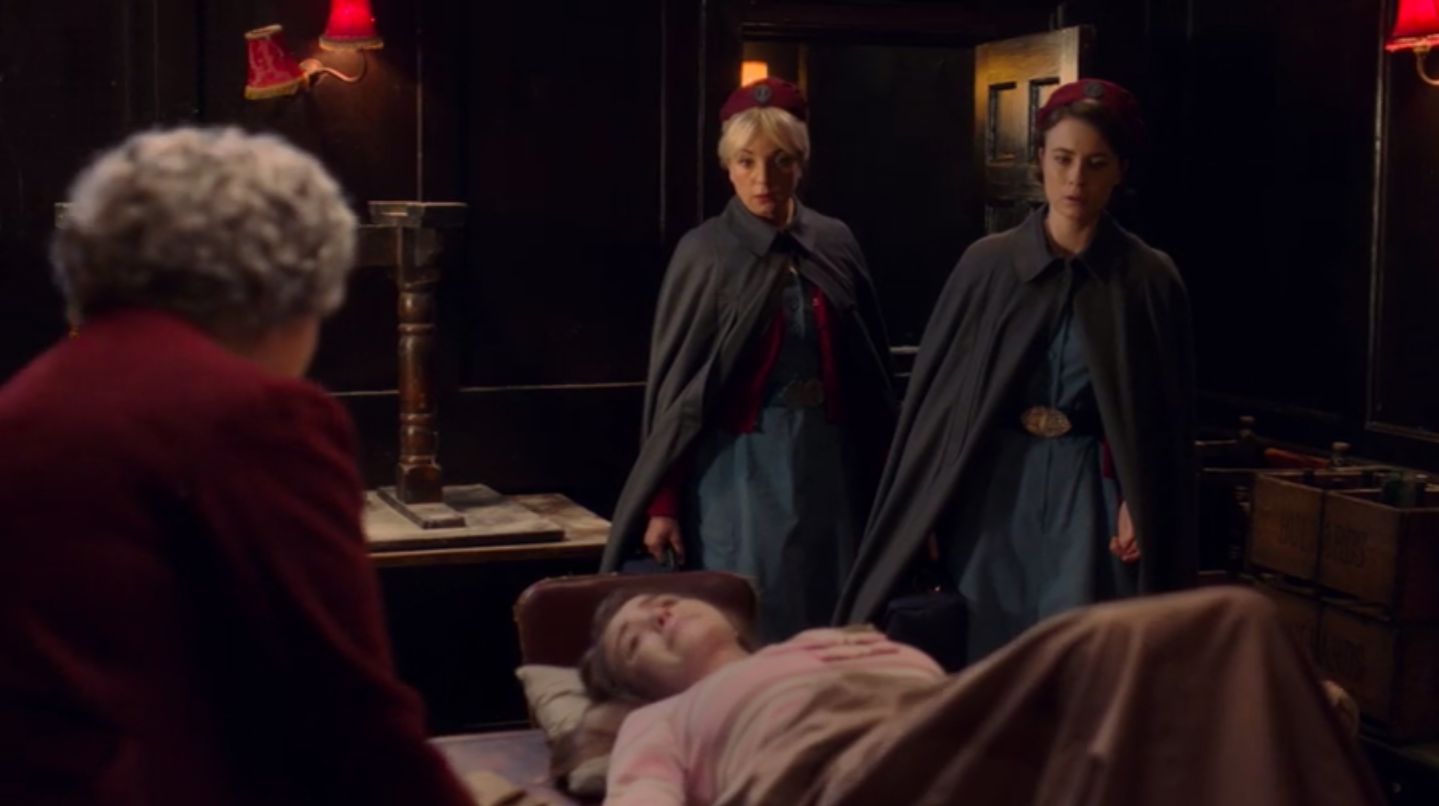Usually, no one dies on Call the Midwife. And it’s definitely a good thing since the show focuses on giving birth. I mean, I for one, would not watch a dead baby (or a dead mommy) show. No, Call the Midwife uses death sparingly, unlike say Grey’s Anatomy where you can expect about a third of the patients to kick the bucket. So when in season eight Jeannie Tennant dies, I was surprised.
We first meet Jeannie as a new mother in Nurse Trixie’s dance class. She’s the mom who “got her figure back” and is weirdly good (even sexy) with a hula hoop. All this despite having two sons, the youngest one under a year old. Jeannie’s working part-time and saving to buy a house with her husband — this isn’t the typical 60s housewife the media loves to over-represent. Jeannie is a woman with a plan. She has her own agency and knows her strengths and limitations. But then she learns she’s pregnant again despite using protection (FYI/PSA: you have to get your diaphragm refitted after giving birth).
Jeannie doesn’t want a third baby. Trixie offers words of encouragement and so does the good Dr. Turner. But platitudes don’t help Jeannie. She’s a driven and dedicated mother but knows she can’t be a good parent to a third child. When the medical establishment fails her, she gets an abortion. In 1964 London. Where the procedure is still illegal and will remain so for three more years. Soon Jeannie turns gray and sickly, then a day or so later shaking, then cold under all the covers, and finally dead in the ambulance. Now, there’ll be no house for her boys, no mother to lovingly raise them. Jeannie dies but perhaps what hurts the most about this episode is watching all the points where she could have been saved by so many people with the medical knowledge to do so.
“When the medical establishment fails her, she gets an abortion. In 1964 London. Where the procedure is still illegal and will remain so for three more years. Soon Jeannie turns gray and sickly, then a day or so later shaking, then cold under all the covers, and finally dead in the ambulance.”
Call the Midwife has shown illegal abortion before with its many complications but this is the first time someone has died of it. In season two, we saw a mother of eight suffer from a poorly done procedure, barely surviving to tell the tale. Last season, Magda (Nurse Shelagh and Dr. Turner’s au pair) induces her own miscarriage after looking it up in the couple’s medical books. She collapses in the garden and is saved just in the nick of time (but alas, is their au pair no longer). Even earlier this season, we followed a woman through an abortion that ends with her losing her ability to have children.

Clearly, the consequences of illegal abortion are bad — for women, mothers, and their children. With Jeannie’s death, Call the Midwife upped the stakes. This isn’t preeclampsia, which the medical community hadn’t found a treatment for yet. It’s not even the discovery that the drug thalidomide causes severe birth defects. Abortion is something doctors knew how to do safely in 1964 but chose not to. Because it was illegal. Because they could lose their jobs. Perhaps, because they objected. But whatever the reason, women suffered enormously, some even losing their lives.
It’s not clear what the nuns, midwives, and Dr. Turner actually think about abortion. Trixie wants to wring the abortionist’s neck but doesn’t offer an opinion on the procedure. Shelagh comforts her husband, reminding him that he was only following the law. Dr. Turner, one of the few men on the show, gets the most lines on the subject, telling the police by way of background: “Jeannie was unhappy. Jeannie was frightened. Jeannie did not want to have a baby… We see this all the time. Young, young girls. Exhausted older women. Mothers who don’t know where their next penny or their next beating’s coming from! And others who want to take control of their bodies and their lives. And all we can do is pat them on the hand and say ‘You’ll manage, everybody does.’ But not everybody does. Not everybody believes us. I’m so sorry, I can’t help you. But I’m even more sorry that I couldn’t help her.”
“Abortion is something doctors knew how to do safely in 1964 but chose not to. Because it was illegal. Because they could lose their jobs. Perhaps, because they objected. But whatever the reason, women suffered enormously, some even losing their lives.”
So would the inhabitants of Nonnatus House offer abortions if they were legal? If the show gets a few more seasons, we may be able to see. We only have to make it to 1967 for Great Britain to change its laws and allow abortionup to 24 weeks and after that for medical reasons. In Jeannie’s episode, we only see our favorite practitioners doing their job as good representatives of the state and its laws. In their practice, there are no options for Jeannie other than carrying that baby to term. In a later episode, we’ll meet the abortionist herself and hear her justification for offering these women dangerous, amateur services — she says she’s just trying to help, to provide something the medical establishment won’t even if some of her customers end up butchered along the way.
Call the Midwife airs in England months before it comes to the US so its ability and propensity to respond to American news is limited. That said, with the recent abortion bans in Georgia, Alabama, and other states, it’s hard not to feel like this season is directed towards us stateside. We know what happens when abortion is illegal. Women don’t suddenly decide to keep every unwanted pregnancy. They still terminate — they just do so risking their health and their lives.
We know what happens when abortion is illegal. Women don’t suddenly decide to keep every unwanted pregnancy. They still terminate — they just do so risking their health and their lives.
As Sister Monica Joan says “do you ask how the fish in the murk of the ocean finds the light? How the rat in the rubble locates the air? In extremis, necessity finds a way.” In this case, many women encounter preventable death and injury just to find it. The costumes and cars of Call the Midwife are cute, but as a woman, the nostalgia stops there. I don’t want to live in the 1960s — visiting for an hour a week or so is fine. Let’s not take our laws and our bodies back there. The price is much too high.


